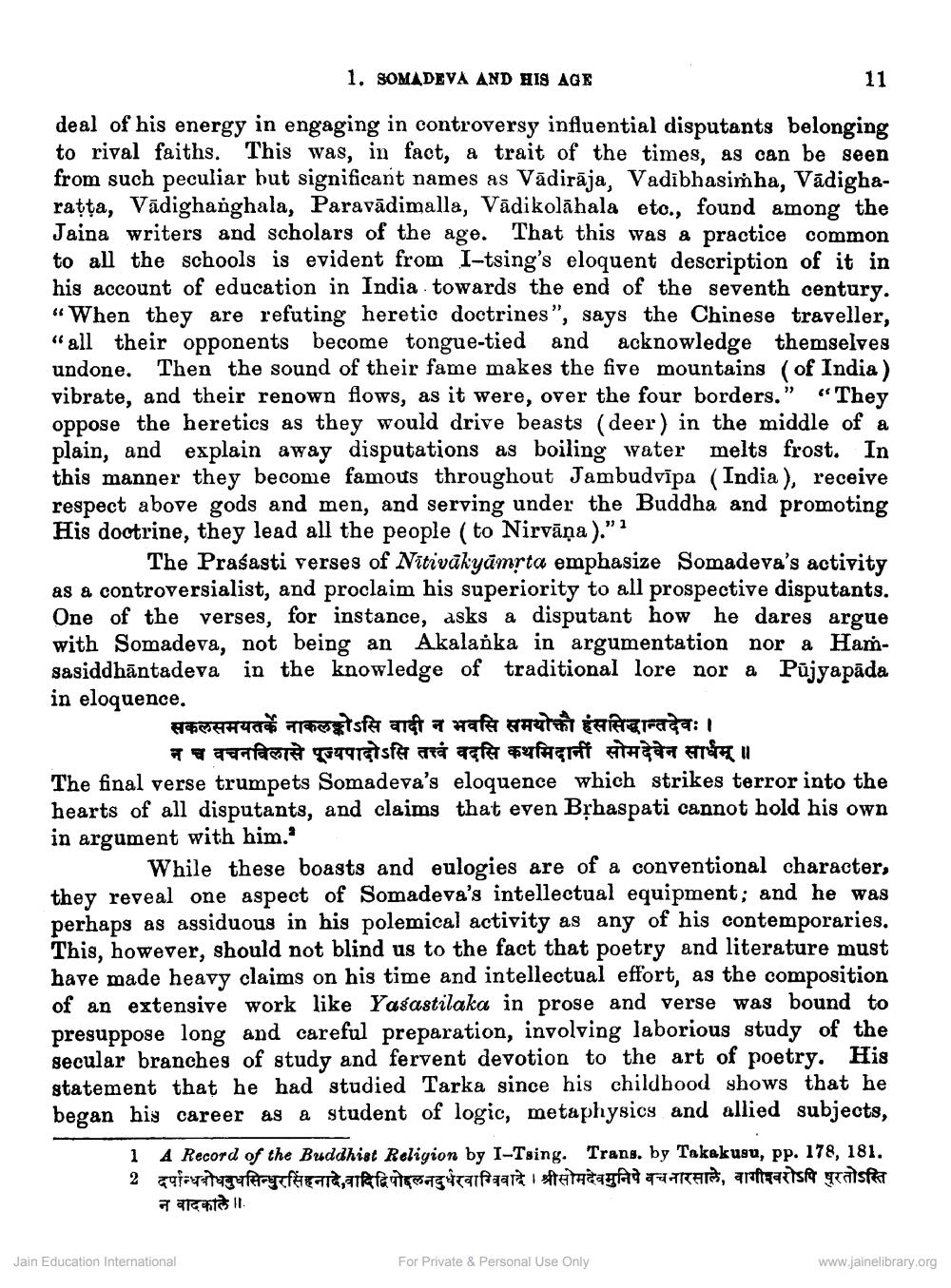________________
1. SOMADEVA AND HIS AQE
11
deal of his energy in engaging in controversy influential disputants belonging to rival faiths. This was, in fact, a trait of the times, as can be seen from such peculiar but significant names as Vādirāja, Vadibhasimha, Vadigharatta, Vādighanghala, Paravādimalla, Vādikolāhala eto., found among the Jaina writers and scholars of the age. That this was a practice common to all the schools is evident from I-tsing's eloquent description of it in his account of education in India towards the end of the seventh century. “ When they are refuting heretio doctrines", says the Chinese traveller, “ all their opponents become tongue-tied and acknowledge themselves undone. Then the sound of their fame makes the five mountains (of India ) vibrate, and their renown flows, as it were, over the four borders." "They oppose the heretics as they would drive beasts (deer) in the middle of a plain, and explain away disputations as boiling water melts frost. In this manner they become famous throughout Jambudvīpa (India), receive respect above gods and men, and serving under the Buddha and promoting His doctrine, they lead all the people (to Nirvāņa)."
The Prasasti verses of Nitivākyāmsta emphasize Somadeva's activity as a controversialist, and proclaim his superiority to all prospective disputants. One of the verses, for instance, asks a disputant how he dares argu with Somadeva, not being an Akalanka in argumentation nor a Hamsasiddhāntadeva in the knowledge of traditional lore nor a Pūjyapāda in eloquence.
___ सकलसमयत नाकलकोऽसि वादी न भवसि समयोक्तौ हंससिद्धान्तदेवः ।
नच वचनविलासे पूज्यपादोऽसि तत्त्वं वदसि कथमिदानीं सोमदेवेन सार्धम् ॥ The final verse trumpets Somadeva's eloquence which strikes terror into the hearts of all disputants, and claims that even Brhaspati cannot hold his own in argument with him.
While these boasts and eulogies are of a conventional character, they reveal one aspect of Somadeva's intellectual equipment; and he was perhaps as assiduous in his polemical activity as any of his contemporaries. This, however, should not blind us to the fact that poetry and literature must have made heavy claims on his time and intellectual effort as the composition of an extensive work like Yasastilaka in prose and verse was bound to presuppose long and careful preparation, involving laborious study of the secular branches of study and fervent devotion to the art of poetry. His statement that he had studied Tarka since his childhood shows that he began his career as a student of logic, metaphysics and allied subjects,
1 A Record of the Buddhist Religion by I-Tsing. Trans. by Takakugu, pp. 178, 181. 2 दन्धिबोधबुधसिन्धुरसिंहनादे,वादिद्विपोद्दलनदुर्धरवाग्विवादे । श्रीसोमदेवमुनिपे वचनारसाले, वागीश्वरोऽपि पुरतोऽस्ति
TRAITS HI
Jain Education International
For Private & Personal Use Only
www.jainelibrary.org




